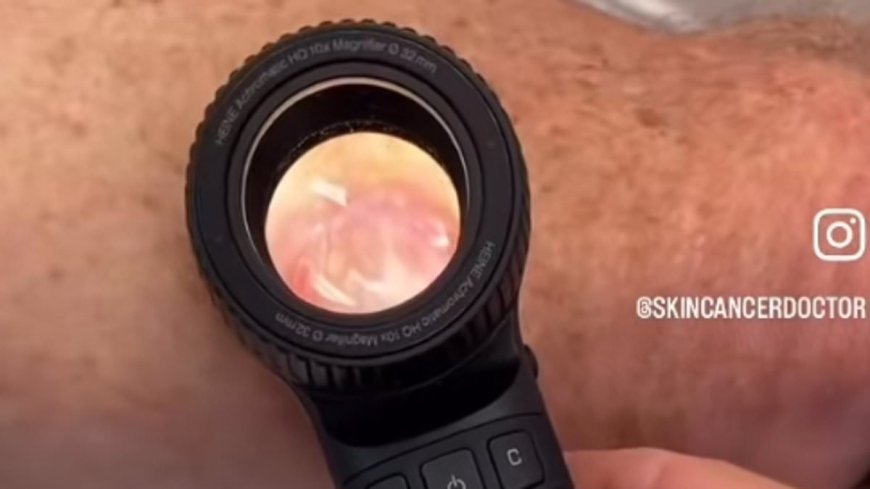Skin Cancer Doctor Shares Shocking Video of Worst Melanoma: Not All Look Like Moles
A leading GP warns about the dangers of melanoma, emphasizing that not all cases resemble typical moles. Dr. John O'Bryen showcases a severe melanoma case in a viral TikTok video, urging people to seek medical attention for any skin changes. Early detection is crucial to prevent melanoma from spreading.

Don't ignore new bumps on the skin, even if they do not look like typical red-flag warning signs of skin cancer, a leading GP has warned.
Melanoma is one of the most dangerous types of cancer, accounting for four out of five deaths.
Experts have long urged the public to look out for moles which have grown in size, changed colour or shape, as these are tell-tale signs that it may have become cancerous.
But now, Dr John O'Bryen, a specialist GP at Body Scan Skin Cancer Clinic, Australia wants to remind people that not all melanomas present as freckles or moles.
'Not all melanomas are brown and black' he said in a TikTok video that has been viewed nearly 106,000 times.
In the video he showed a close-up of 'the worst melanoma' he has ever seen—the second most common type of melanoma which can develop anywhere on the body.
'Nodular melanomas grow quickly and cause the greatest fatality', he reminded his followers before urging them to see a doctor if they are concerned about any changes to their skin.
He explained: 'A man came to me last week concerned about a new bump on his arm. It was red and had quickly grown in size.'
The melanoma was around 4mm wide and presented as elevated, firm and growing.
The seconds-long clip saw the medic using a magnifying lens to really zoom in on the painful-looking legion, revealing a patchy network of bloody vessels and white patches.
Further inspection revealed 'white polarising lines' and 'polymorphous vessels', both of which point to skin cancer.
According to Cancer Research UK, nodular melanomas tend to grow downwards, into the deeper layers of the skin.
A tell-tale sign of this type of melanoma is a raised area on the surface of the skin anywhere on the body.
This type of cancer is most commonly found in people in their 40s and 50s.
When diagnosing melanoma skin cancer—cancer that starts in cells called melanocytes found in the skin, tissue lining some parts of the body such as the mouth, and the eye—doctors typically use a checklist known as the ABCDEs.
This includes asymmetry, border, colour, diameter and evolving moles as tell-tale warning signs for the disease.
Dr O'Bryen said in the TikTok that it was the worst case of melanoma he has seen, presenting as a red raised bump on the patient's arm.
Signs of skin cancer range from innocuous to obvious, but experts warn that treating cases early is key to making sure they do not spread or further develop.
However, the charity warns that having some of these changes on their own does not definitely confirm melanoma—with some non-cancerous moles causing the surrounding skin to become itchy.
Even so, Dr O'Bryen urged his followers to contact their GP if they experience any changes to their skin, even if they have none of the ABCDE signs.
This can help doctors diagnose the cancer early, before it has spread around the body.
At this early stage, doctors can remove the cancerous cells in a simple surgery performed under local anesthetic.
It comes as Cancer Research UK predict there could be as many as 26,5000 new cases of melanoma diagnosed every year by 2040—with the incidence rate rising faster than any other common cancer.
Currently around 17,500 people are diagnosed with melanoma skin cancer each year, but experts nearly 90 per cent of skin cancer cases could be avoided.
This is because most skin cancers are caused by sun damage, and more specifically over-exposure to ultraviolet rays either directly from the sun or sunbeds.
As such, the NHS recommends staying out of the sun during the hottest part of the day, when UV rays are strongest, keeping legs and arms covered and using sunscreen with a sun protection factor (SPF) of at least 30.
Dr O'Bryen's advice comes as patients with the deadliest type of skin cancer are set to be given fast-tracked access to a revolutionary cancer vaccine on the NHS.
Melanoma is one of the most dangerous and deadly forms of skin cancer, but experts warn that an alarming 87 per cent of cases could be avoided if people were more careful in the sun.
The needle-free injection is custom-built for patients to stop their melanoma returning—which experts believe will herald a new era in fighting the disease.
It works by boosting the immune system's response, helping it to 'attack' proteins that are specific to melanoma tumours, preventing them from returning.
Currently, around half of patients diagnosed with melanoma respond to immunotherapy.
But those who don't are at a higher risk of their cancer getting worse.
The NHS website reads: 'Checking your moles every few months is essential.'
What's Your Reaction?
 Like
0
Like
0
 Dislike
0
Dislike
0
 Love
0
Love
0
 Funny
0
Funny
0
 Angry
0
Angry
0
 Sad
0
Sad
0
 Wow
0
Wow
0













































































































































































